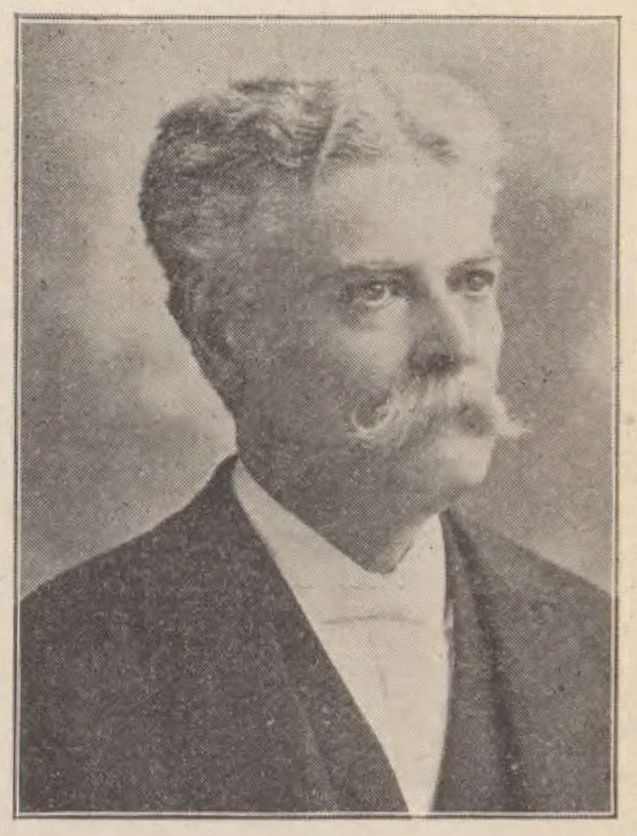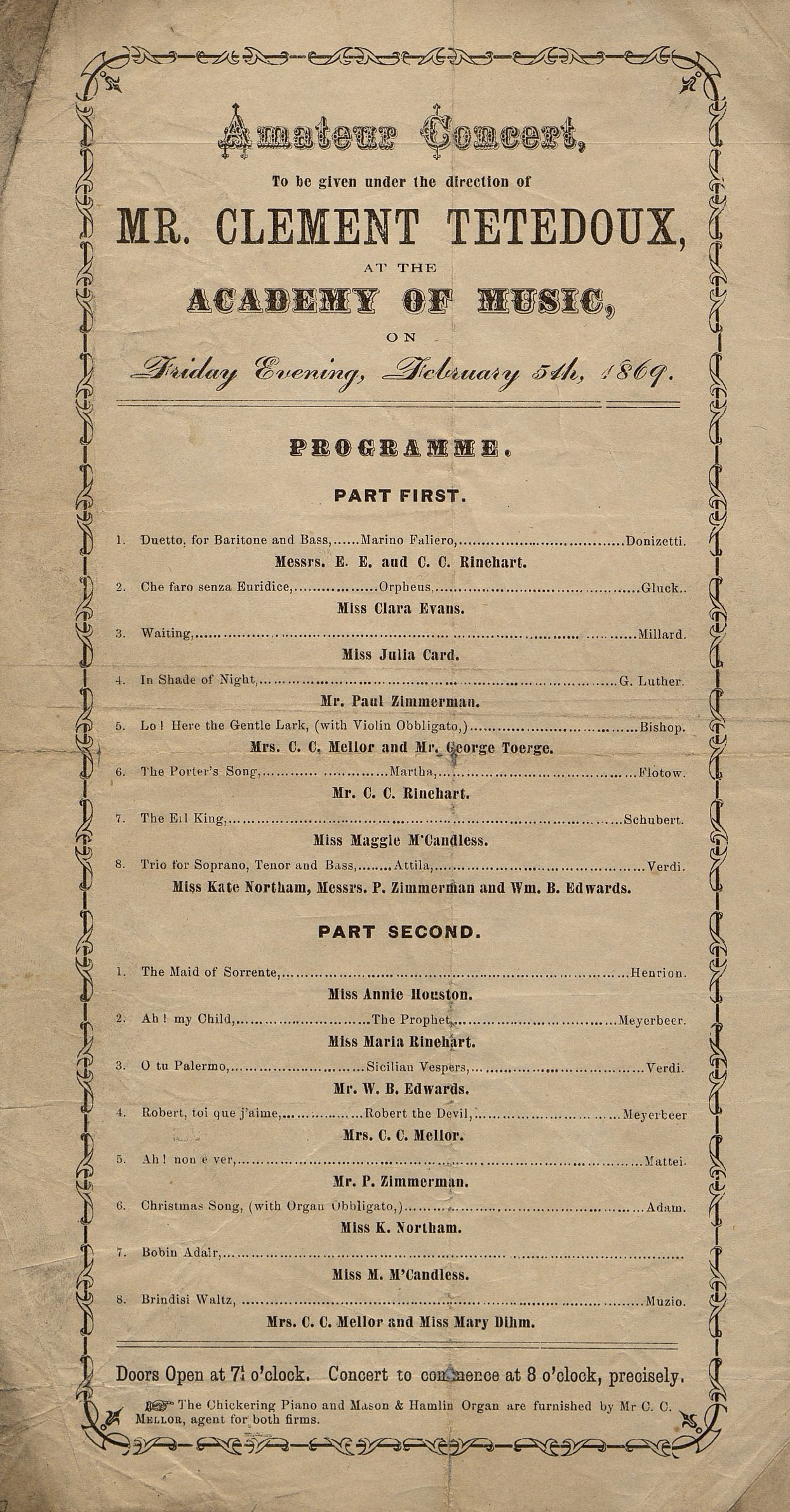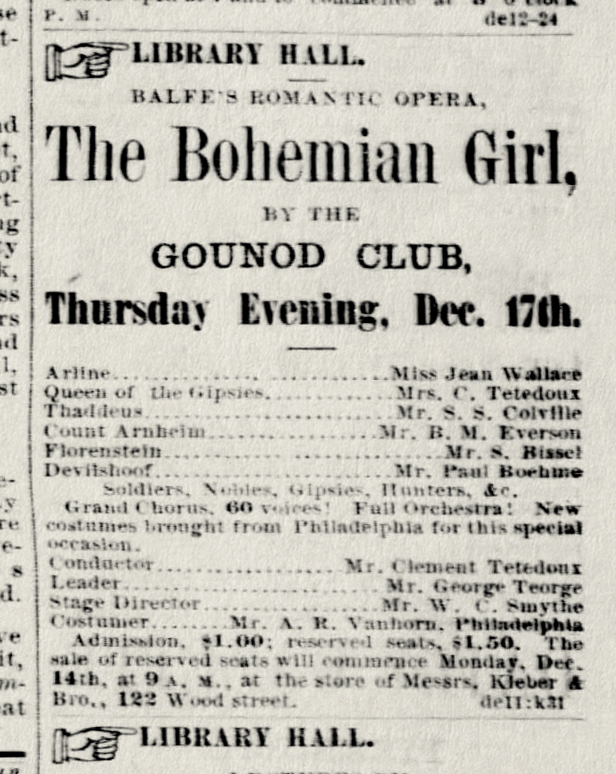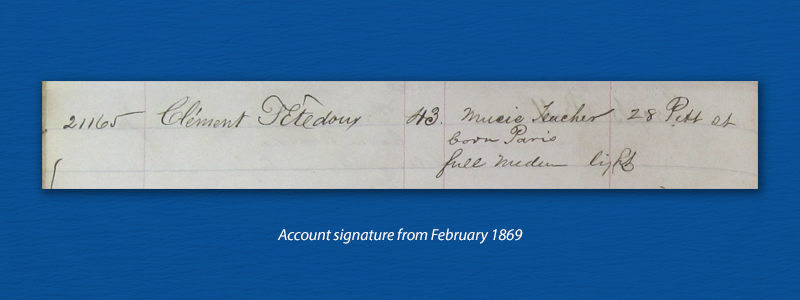 Clement Tetedoux. Courtesy of University of Pittsburgh Archives.
Clement Tetedoux. Courtesy of University of Pittsburgh Archives.
Early Life
Clement Tetedoux (1825-1901) was widely acclaimed as one of the finest vocal teachers in the United States in the late 1800s. Instrumental to the development of Pittsburgh’s early musical community, he was involved in both the training of professional musicians and the cultivation of music-loving audiences.
Born Pierre Louis Clement Tetedoux in Paris, he attended Lycée Charlemagne and the Conservatoire de Musique at Paris. Fluent in several languages, as a young man he tutored the son of a Russian nobleman before he decided that music was his true calling.
Tetedoux enjoyed a first-rate classical music education in France, Italy and Russia, where his teachers included operatic tenor Marco Bordogni, composer Giuseppe Ceccherini, and tenor-composer Alphonse Révial. While studying in Italy, Tetedoux also became a pupil of composer Gioachino Rossini.
From Monsieur Révial, Clement Tetedoux earned a high recommendation: “Mr. Tetedoux possesses the double advantage of an Italian and French education, a perfect mastery of the bel canto and full command of lyric declamation; a sensitive temperament, poetical nature, dramatic instinct and cultivated intellect.”
Musical Pioneer and Maestro
Around 1855, Tetedoux married a young American widow, Apolline Guilford Donaldson, who was traveling in Europe at the time. Her father, lawyer and educator Nathan Guilford, had founded the public school system in Cincinnati. Tetedoux moved to America, where he and his wife lived in Cincinnati before moving to Pittsburgh in 1858.
The musical scene in the city was still developing. Pittsburgh had no symphony orchestra, and musical societies and festivals were all but unheard of. There were theaters for traveling professional entertainers and musicians, but little infrastructure existed for home talent. This was the challenging environment that confronted Tetedoux when he first offered his services as a vocal teacher. Until a broad base of music aficionados could be cultivated in the local populace, there would be few opportunities for professional musicians to earn steady incomes while living in Pittsburgh.
Putting roots down in Pittsburgh was a family effort. As Clement Tetedoux advertised his services as a vocal teacher and made contacts at John H. Mellor’s music store, Apolline Tetedoux started a boarding and day school for young ladies, teaching French, Italian, German and Latin languages, French literature, fine arts and piano. Clement Tetedoux assisted his wife in arts and music instruction.
The first concert featuring Tetedoux’s students and adult amateurs, held in February 1860, drew “a large and fashionable” audience, according to the Pittsburgh Post. The concert “was a rare musical treat as is seldom offered in this city,” featuring selections from Haydn, Rossini’s “The Barber of Seville,” and Verdi’s “La Traviata” and “Rigoletto.” A subsequent concert in April 1860 saw proceeds going towards buying French literature books for the library at the Tetedouxs’ boarding school.
Just one year later, the nation was at war. Tetedoux held student/amateur benefit concerts in 1863 and 1864 in support of the Subsistence Committee, a fund for aiding sick and wounded soldiers. In addition to supporting a good cause, the concerts drew large audiences due to the high quality of musical selections and performances.
Among Tetedoux’s students singing in these early concerts was Henry K. Colton, the young son of Dollar Bank founder Charles Colton. Tetedoux himself, an accomplished singer with a fine baritone voice, performed several times.
In April 1865, the Pittsburgh Commercial noted approvingly that the appetite among local audiences had increased rapidly during the trials of wartime life, but the paper lamented the “lasting disgrace to the city, that there is no convenient and suitable audience hall, adapted to the requirements of music.” The paper had been banging that drum for some time, a few months prior describing how a visiting opera company had “performed in a miserable room wholly unfit even for an ordinary concert.” The message got through. Leading citizens of the city organized and got built a new 2,400-seat Academy of Music on the site of the old Athenium Theater on Liberty Street (Liberty Avenue). The resplendent new theater, inaugurated in May 1866, was managed by actress Ettie Henderson, wife of William Henderson, manager of the Pittsburgh Theater.
As Pittsburghers’ preferences for classical music productions grew, so did the artistic vision of Clement Tetedoux. After the Civil War, he expanded the scale of his concerts from ballad solos and operatic arias and duets to oratorios. Tetedoux led Pittsburgh’s first-ever complete performance of Rossini’s “Stabat Mater” in April 1868 at the Academy of Music. The production called for a chorus of more than 50 singers and a 25-piece orchestra.
Other works which had their Pittsburgh premieres under Clement Tetedoux were the romantic comic opera “Martha” by Flotow (1874), “The Bohemian Girl” and “The Rose of Castille” by Balfe in 1874 and 1875 respectively, Mendelssohn’s “Elijah” (1877), Offenbach’s “Marriage by Lanterns” (1877), with lyrics translated into English by Tetedoux, Verdi’s “Requiem” (1879), Victor Massé’s “Paul and Virginia” (1879), and Haydn’s “The Creation” (1880).
The 1870s and 1880 performances were sponsored by the Gounod Club, a musical society co-founded by Clement Tetedoux in the fall of 1871. Named in honor of French composer Charles Gounod, the club drew enthusiastic amateur singers who dedicated themselves to rehearsals and performances under Tetedoux’s baton. They held their first recital in June 1872 and grew into a first-rate musical organization, hosting European musicians like German violinist Benno Walter and producing operas and oratorios. The Pittsburgh Post called the Gounod Club “the most efficient aid of musical culture in our city.” It was the parent organization of many subsequent musical societies in Pittsburgh.
One of the grandest musical events given by the Gounod Club and led by Tetedoux was the pair of benefit performances of Handel’s “Messiah” in November 1878 at Exposition Hall. Featuring 400 voices and a 42-piece orchestra, the performances were dubbed “flawless” and drew audience members from as far away as Altoona, Wheeling and East Palestine, Ohio. Nearly 8,000 people attended the pair of concerts.
In the fall of 1880, Tetedoux and his family left Pittsburgh for Chicago, where he again set up his shingle as a vocal teacher. He maintained friends and devoted former students in Pittsburgh, occasionally returning to visit and conduct concerts. Tetedoux also lived and taught in New York City and spent the summer of 1898 in Salt Lake City teaching vocalists. He returned to his native France only once, in 1889, to attend the Paris Exposition. Tetedoux accepted the position as head of the Pittsburgh Conservatory of Music in 1900 and taught there until his death in February 1901.
Tetedoux’s legacy included students who became vocal teachers and several who went on to have successful professional singing careers. These included operatic soprano Effie Stewart and tenors Whitney Mockridge and George Ferguson. The London publication The Musical Courier hailed Tetedoux as one of the most distinguished vocal teachers in the world.
Clement Tetedoux was married twice. He and his first wife, Apolline Guilford Tetedoux, divorced in 1866. She returned to her home town of Cincinnati. Tetedoux subsequently married Eliza Cowley, a singer and the sister of Alexander Cowley, one of the founders of Iron City College. Clement Tetedoux’s daughter Clementine Tetedoux-Lusk, a gifted soprano, followed her father into the music world as an opera performer and music teacher.
 Concert program, 1869. Courtesy of University of Pittsburgh Archives.
Concert program, 1869. Courtesy of University of Pittsburgh Archives.
 1874 advertisement for "The Bohemian Girl"
1874 advertisement for "The Bohemian Girl"
